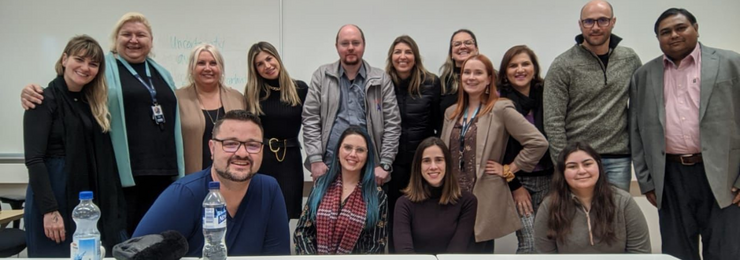What comes from mixing international knowledge, students from Brazil and teachers from Finland? Active discussions about sustainability, cross-cultural communication and strategy. A vivid day full of ah-ha moments!
Diving into sustainability and its many facets – “Is our society really sustainable?”
HAMK Senior Lecturer, Simona Chilba started the day with a presentation for the Brazilian guests at Valkeakoski campus, followed by vivid discussions on what is understood by sustainability, and what are the true facts about how sustainable our society is. Interesting was the fact that sustainability is still not totally understood! Dialogue sparked clarifications on sustainability itself and what it comprises. The three pillars of sustainability: social, environmental and economic, were brought into discussion.
Attendees were excited to learn about all facets of sustainable development and UN SDGs were exemplified. Companies that implement sustainable business models were brought into the conversation, with a focus on saving resources, increasing efficiency of the systems, and extension of sustainability efforts to customers. Circular business models were also discussed, and some key global facts on sustainability were touched upon. The solutions found sparked immense enthusiasm!
The topic turned to how sustainability can be implemented in everyone’s personal lifestyle. Finland being a leader in sustainability was brought to the forefront, and guests showed the desire to apply the same concepts and ideas to their own society. The greatest outcome was noticing that everyone agreed that education is the most important factor in changing societal thinking. A good example of this is Finland and how they teach kindergarten children about recycling and caring about nature.
Demystifying strategy – examining cases from Finland
Principal Lecturer Sajal Kabiraj presented his lecture on “Strategy Demystified: Lessons from Finnish Companies”, to our Brazilian guests at HAMK IB. We started our discussion of how important it is for Finnish companies to engage in strategic planning as it is the managerial process that helps to develop a strategic and viable fit between the firm’s objectives, skills, and resources with the market opportunities available. It helps Finnish firms deliver their targeted profits and growth through their businesses and products. One of the key takeaways was it is therefore necessary to understand how a firm redefines its business and it can be a game plan for long-term survival and growth.
Four compact case studies of Finnish companies, namely, Nokia, Moomin, Marimekko, and Valio with only one dilemma within a bounded context were discussed. The MBA students from Brazil were excited to know and discuss how Finnish companies operate with agility and a design thinking approach in different parts of the world. Infusion of design thinking makes Finnish companies more innovative and solve problems more creatively for global markets. Dilemma indicated the main problem that the case revolved around. The cases generated interest in fostering lively classroom discussions and reached the dilemma faced by the protagonist of the case. Alternatives were placed before the students. It was a good experience to interact with students and the Professor from the University of Feevale, Brazil, and learn from their experiences and gain a different perspective. One of the unique perspectives was businesses everywhere are solving problems in the context of people.
Comparing cultures leads to ah-ha moments
As everyone is aware, cross-cultural communication is an essential part of doing business. This was the second theme of the day. Our colleague Senior Lecturer Melanie Kirwa facilitated a workshop about the differences between Brazilian culture, Finnish culture and Romanian culture, and Simona participated and could provide insights regarding her home country. Melanie started by discussing her experiences while living in Brazil. The students were excited by this as she lived in a city very close to their university.
Then, by examining Hofstede’s six cultural dimensions, the group analyzed the Brazilian, Finnish and Romanian cultures. Only a few students were familiar with Hofstede and were very keen to discuss each dimension. How Brazil ranks compared to Finland produced lively dialogue. There were many surprises! It was fun to notice that the dimensions discussed sparked curiosity in the attendees. For instance, the Brazilian culture is neither masculine nor feminine, and scores somewhere in the middle. This shocked the students as they had the notion that their culture is very masculine.
Another interesting moment was for Simona, who was surprised to find out that her society scores high on the scale of uncertainty avoidance. It was a very collaborative lesson with lots of space for “ah-ha moments.” The discussions were active as all attendees explained their own vision of Hofstede’s dimensions. It was noticed that personal impressions are sometimes only personal. Following Melanie’s workshop, the Brazilian guests were motivated to explore these cultural aspects independently.
The International Business Degree Programme in Valkeakoski had the pleasure of hosting a day of lectures for a group of Master’s students from the University of Feevale, Brazil, led by Professor Moema Pereira Nunes. The day was structured with campus visits, collaborative discussions, and three lectures given by Simona Chilba, Melanie Kirwa and Sajal Kabiraj, and focused on Sustainability, Cross-Cultural Communication, and Strategy. This enriched the knowledge of all attendees, students and teachers. Possible future collaborations have also been discussed, adding more substance to the Brazilian group visit, from both sides. Days like this add so much value to all participating members, both students and lecturers.
Authors:
Simona Chilba, Senior Lecturer in International Business Degree Programme
Sajal Kabiraj, Principal Lecturer in International Business Degree Programme




